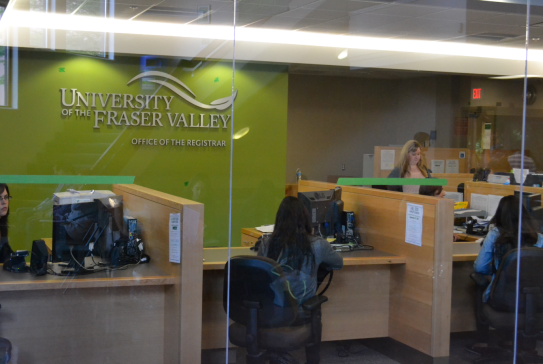By Katie Stobbart (The Cascade) – Email
Print Edition: September 4, 2013
Developing new degree programs can be a long and costly process. However, UFV recently received official approval of its application for exempt status from the Minister of Advanced Education, making that process faster and less expensive.
Usually, an institution must send proposals for new degrees to the Degree Quality Assessment Board (DQAB) for approval. Then, after a process often taking several months, the DQAB decides whether to recommend approval of a program to the Minister of Advanced Education, who may take months more to decide if the new degree will be approved. With exempt status, an institution is able to cut out the middle step by sending degree proposals directly to the Minister.
“It’s much faster and it’s cheaper,” Eric Davis, Provost and Vice-President, Academic says, noting that the cost to have each program reviewed by the DQAB is roughly $8000. “Say you want to approve six new programs in a year – that’s almost $50,000.”
UFV first applied for exempt status in 2009. After a site visit by an external review team, it was recommended to the DQAB that UFV receive exempt status, but the board did not agree with the recommendation; although UFV had a program review policy, it had only just been created.
“They said to do a year or so of program reviews, then reapply. We did that – it took about two years to finish the program review cycle, and we reapplied. In late [February] 2012, it was recommended to the Minister that we get exempt status. Then we heard nothing for a year … and we were told that because they had done a review of the entire DQAB process, they weren’t going to proceed with recommendations for exempt status [yet],” Davis explains.
According to the 2011 review of the degree approval process in BC, a temporary moratorium was put in place on the approval of new degree proposals and an advisory panel formed to make recommendations to government about streamlining and redesigning the process, contributing to the delay of approval on UFV’s application for exempt status.
A little over four years after its initial application, UFV has been approved.
“The exempt status is a milestone partly because our program reviews are recognized as excellent, meaning we need less oversight and we’re no different from any other university,” Davis says. “It was a long process, and it’s a great feeling of satisfaction that our institution has achieved this goal.”
With an expedited process, UFV has several programs in development or nearing approval within the next year. A cohort program for teacher education at the secondary level is currently waiting for the Minister’s approval. Other programs still undergoing internal review include a media arts degree, an indigenous studies major and minor, a bachelor of agriculture, an engineering physics program in mechatronics, and a bachelor of education.
“You have to be very strategic about the programs you put on, confident that there is student demand for those programs [and] that there are good employment prospects for graduates,” Davis says, noting there are other potential programs which are being considered for later years. “Because we don’t get any growth money from the province—and haven’t for years; no post-secondary institution has—we have to be strategic with what we do in terms of new programming, because ultimately … you can only use your resources for so many things.”
However, it seems that a shorter and less costly degree approval process will give UFV some additional room to grow as well as give students some new opportunities for study.



